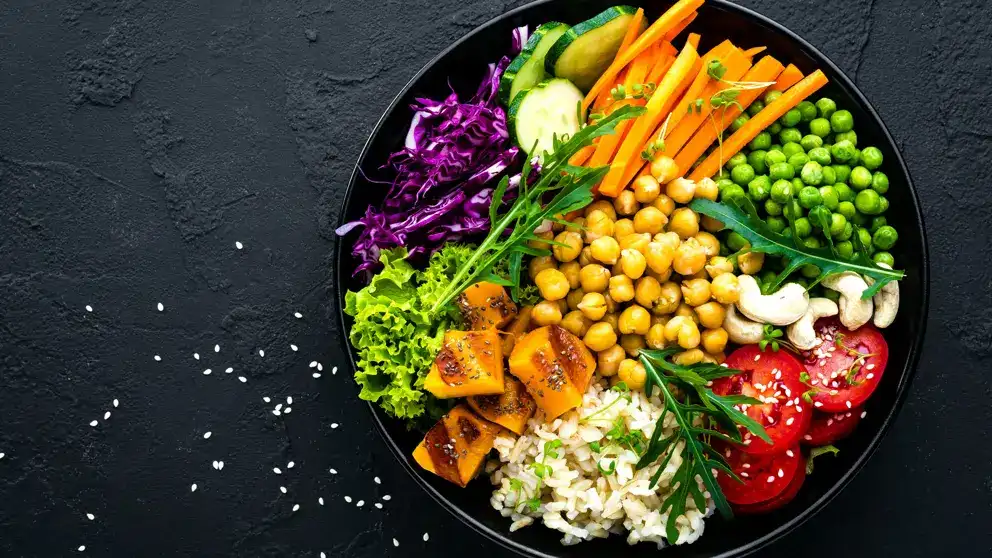The Mediterranean diet is a thoroughly researched and well-supported eating plan for heart health. The foundation of the plan includes eating vegetables, fruit, grains, beans, nuts, seeds, fish and olive oil, while reducing the intake of meats and sweets.
We don’t live in the Mediterranean, of course. But the good news is that it’s possible to mimic the nutrients that make up the Mediterranean diet using foods that are grown in Canada or are available locally — and that appeal to our multicultural population.
This guide will show you how to make choices that will provide the nutrients your body needs, while staying true to foods that fit your taste buds, recipe preferences and buying habits.
Build your plate
The Mediterranean-style pattern is similar to Canada’s Food Guide, which recommends ½ plate vegetables and fruit; ¼ plate whole grain and ¼ plate protein at meals. Here’s how to build a nourishing meal with these three proportions in mind.
Vegetables and fruit: Dietary patterns to prevent and manage cardiovascular disease should be rich in vegetables and fruit, which provide fibre, vitamins, minerals and antioxidants.
In Canada, we grow a variety of vegetables and fruit (the brackets indicate some alternative names from various East Asian, South Asian and African countries):
- Leafy greens: spinach (paalak), kale (muriwo), bok choy, mustard greens (gai choy or sarso), lettuce, cabbage, hinn choy, snow pea shoots, Swiss chard, summer savory, collard greens (haak or sukuma), rapini, water spinach (tung choy or kalmi) and more.
- Other vegetables: eggplant (brinjal or aubergine), cauliflower, bitter melon (karela), zucchini (courgette), broccoli, onion, garlic, tomatoes, chayote, celery, daikon radish, mushrooms, squash, peppers, sweet potato and more.
- Fruits: apples, pears, cantaloupe (muskmelon), berries, watermelon, peaches, plums, grapes and more.
- Important imports: Of course, vegetables and fruit like bananas, plantain, yuca, jicama, mangoes, papaya, durian, lychee, pineapple, jackfruit and rambutan are not grown locally because of our climate. But many grocery stores across Canada carry these items, so they can still be a nutritious part of your "Canadian diet."
Recipes starring vegetables and fruit:
Grains: Studies show that whole grains, which are high in fibre, are more cardio-protective than refined grains. That doesn’t mean you can’t enjoy a baguette or white rice, but it does mean that you should make an effort to add whole grains to your diet more often. Studies show that people who choose three servings of whole grain foods, compared to those who eat fewer whole grains, have a 20-30% reduced risk of developing heart disease.
- Some Canadian-grown options are oats, barley, quinoa, wild rice, whole grain wheat, millet, rye, sorghum, buckwheat and corn.
- Important imports: The only grain we don’t grow in abundance is white or brown rice, but that’s easy to access at the grocery store.
Recipes starring grains:
Protein: The Mediterranean diet is largely plant-based, but it’s not strictly vegan. There is certainly room for chicken, fish, eggs and dairy products, and those are all locally raised-foods.
If you want to choose more plants for protein, these options are homegrown:
- Soybeans, which are made into and sold as tofu, tempeh and soy beverage
- Chickpeas, which can be eaten whole, mashed into spread or made into flour
- Lentils and split peas (dal)
- Kidney, black turtle, adzuki, fava, pinto, otebo and small red beans
- Flax, hemp and chia seeds, either whole or ground
- Sunflower and pumpkin seeds, and nut butter made from these
- Hazelnuts and black walnuts
Omega-3 fats, particularly DHA and EPA, are important for heart health. For those, we turn to the east and west coasts of Canada, where we fish salmon, herring, trout and mackerel.
Recipes starring protein:
Healthy oils: While no oil truly rivals the high monounsaturated fat and polyphenol content of olive oil, Canada grows seeds that make flax, canola, hemp and camelina oils.
The Mediterranean diet also emphasizes a reduction in ultra-processed foods, which we can do in any country! It means making more food at home with whole, natural, minimally processed ingredients and having chips, candy, chocolate, pastries and ice cream less often. And when you do eat them, enjoy every bite!
